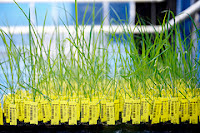 |
| GM Rice / BASF / Flickr Creative Commons |
By Andy Stirling, co-director of the STEPS Centre
But whatever side one is on, this kind of debate can easily miss the single most important fact. ‘GM’ is not one thing. And there exist a wide variety of other innovations – social and organisational as well as scientific and technological – for achieving the same ends (whatever these are). What is most irrational, is to focus disproportionately on ‘GM’ alone. Even more misleading, is to pretend that the issues are just about ‘risk’ – or that the solutions can be determined solely by ‘sound science’ or ‘evidence based policy’. In the end, the answers depend on the questions. Science and evidence have absolutely crucial roles to play, But they are necessary, not sufficient.
The brief comments below respond to some questions about the part wealthier countries play in blocking or enabling GM technology, and the role that science and the public play in shaping decisions about GM and other innovations. To delve further in to these issues, take a look at the 10+ years of research in the STEPS Centre’s Biotechnology Research Archive.
Why are GM crops stuck in the pipeline of regulatory approval?
- Late lessons from early warnings: the precautionary principle 1896–2000 (EEA, 2001)
- Late lessons from early warnings: science, precaution, innovation (EEA, 2013)
Is the EU falling behind other regions in approving GM crops?
GM is not the only biotech solution on offer. Marker-assisted selection and other genomic techniques offer important opportunities for enhancing conventional breeding through biotechnology. Investment in long-term, local, context-specific breeding and crop development programmes is needed.
- Why the fuss about GM food? Other innovations are available (Andy Stirling, The Guardian – Political Science blog, 28 June 2013)
- Innovation, Sustainability, Development: A New Manifesto – full text
This point is underscored by a major recent international assessment:
What role can science play in influencing policy and public opinion?
Like other groups of citizens and organised interests, the diversity of different kinds of science can of course exert influence in many different ways, both on policymakers and on wider public opinions. This is perfectly legitimate – but it should be recognised as a political activity and not something undertaken in the name of ‘science’ as a whole, let alone of ‘objective truth’.
When any “science” organisation invokes the authority of the scientific process in general in favour of any particular technological product, it is being politically partisan. Frequently associated claims to objectivity are also spurious. The result is not only an undermining of reasoned democratic debate, but – by being less than trustworthy – amounts to nothing less than a betrayal of science itself.
Science as a process is equally implicated in a variety of contending innovation trajectories (see above), no one of which is inherently more ‘scientific’ than others.
The “Emerging Biotechnologies” report by the Nuffield Council on Bioethics is a good illustration of this point.
There often exist more effective innovation pathways that do not rely primarily on science-intensive products. When they advocate science-intensive approaches as preferential to these, then scientists are also being more generally politically partisan. In any case, scientific (and wider expert) understandings of the world can never definitively determine any single uniquely rational ‘way forward’. The available evidence always admits a variety of contrasting interpretations.
- Keep it complex, by Andy Stirling (Nature, 2010)
Is the EU’s treatment of GM is having a detrimental impact on developing countries?
In some circumstances, some farmers have benefited from GM crop technologies; while others had bad experiences or were by-passed altogether.
A STEPS Working Paper by Dominic Glover (2009) shows economic returns are highly variable, dependent on a range of factors. GM crops only perform well in good varieties, GM seed start-up costs and technology fees are sometimes too expensive for poorer farmers, and major adopters are usually richer, with more land. Meanwhile the institutional and policy environment is vital: without support, credit and sustained backing, new technologies often fail.
- Africa’s biotechnology battle by Ian Scoones and Dominic Glover, Nature
- GM crops ten years on: hope, hype and reality (Ian Scoones, Institute of Development Studies, May 2009)
- Undying Promise: Agricultural Biotechnology’s Pro-poor Narrative, Ten Years On by Dominic Glover (STEPS Centre 2009)
How crucial is public opinion in the GM debate?
Find out more
- The STEPS Centre’s Biotechnology Research Archive – 10+ years of research into genetically-modified crops, development and the global food crisis
- The STEPS Centre’s research on GM and biotechnology
- See more blogposts about GM and biotechnology